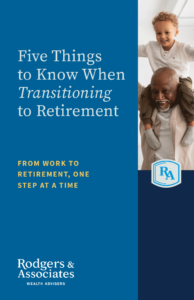This guide will address the following concerns:
Do you have a retirement plan through your employer? One of the most significant decisions new retirees must make is what to do with the money in their company-sponsored retirement plan (401(k), 403(b), 457, etc.). Do you want to receive monthly payments for the rest of your life? Should you roll it over? How do you decide the best option for your situation?
What happens when your paychecks stop? How do you replace your income from employment? Securing a regular, recurring source of retirement income is a priority to have in place before you stop working. Employer pension, Social Security, investments, and possibly part-time employment may all be part of the equation. What is your plan to achieve retirement income with the least risk and taxation?
Retirement income is taxed differently than earned income, but retirees must still prepay taxes ahead of their tax filing deadline to avoid penalties. How will you prepay your taxes in retirement? Will you have taxes deducted from pensions or Social Security checks? Will you make quarterly estimated tax payments? Some sources of retirement income are not subject to taxation. Do you have a plan in place to minimize taxes during retirement?




